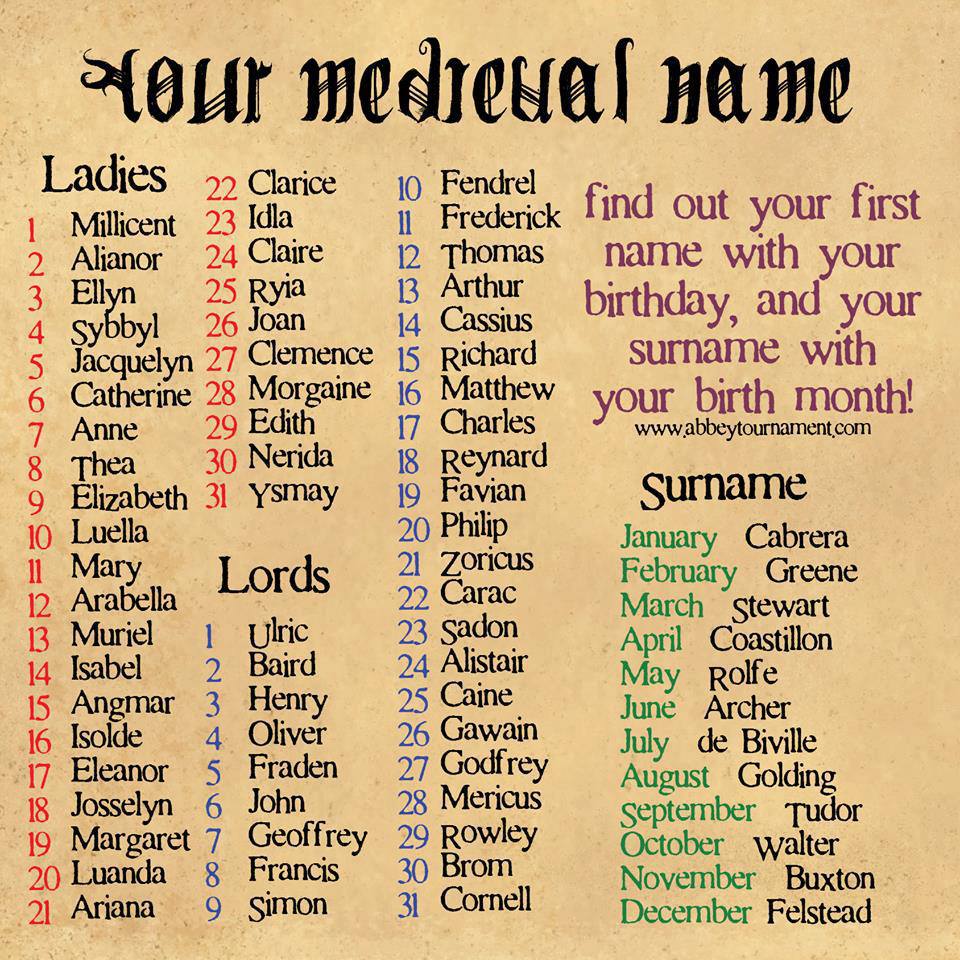Exploring The Fascinating World Of Medieval Names
Medieval names are not just labels; they carry stories, histories, and cultural significance that resonate through time. In the medieval period, names were often derived from various sources, including occupations, locations, and even personal characteristics. This article delves into the intriguing realm of medieval names, exploring their origins, meanings, and the societal roles they played during the Middle Ages.
The use of medieval names provides a window into the past, revealing much about the society and culture of the time. Understanding these names can enrich our knowledge of history and the evolution of language. In this article, we will examine different types of medieval names, their significance, and some notable examples that have stood the test of time.
As we embark on this exploration, we will uncover the diverse influences that shaped medieval names, from the Latinized forms of the early Christian era to the unique local adaptations that emerged across Europe. Join us as we journey through history, discovering the beauty and complexity of medieval nomenclature.
Table of Contents
- Introduction
- Types of Medieval Names
- Origins and Meanings of Medieval Names
- Notable Medieval Names
- Cultural Significance of Medieval Names
- Medieval Names in Modern Culture
- How to Choose a Medieval Name
- Conclusion
Types of Medieval Names
Medieval names can be categorized into several types, each reflecting different aspects of life in the Middle Ages. Here are some key categories:
- Given Names: Personal names used to identify individuals, often based on religious or cultural significance.
- Surnames: Family names that often indicate lineage, occupation, or geographical origin.
- Nicknames: Informal or affectionate names that reflect personal characteristics or traits.
- Occupational Names: Names derived from the profession of an individual, such as Smith or Baker.
Origins and Meanings of Medieval Names
The origins of medieval names are vast and varied, influenced by geography, language, and culture. Some common sources include:
1. Latin Influence
During the medieval period, Latin was the language of the Church and education. Many names were Latinized, leading to variations that still exist today. For example, the name "Peter" comes from the Latin word "Petrus," meaning "rock."
2. Germanic Roots
Germanic tribes played a significant role in shaping medieval nomenclature. Names like "Alfred," meaning "wise counselor," reflect this influence.
3. Celtic Contributions
In regions like Britain and Ireland, Celtic names such as "Aidan" (meaning "little fire") showcase the local culture and language.
4. Norse Influence
Scandinavian settlers introduced names like "Erik" and "Freya," adding to the diversity of medieval nomenclature.
Notable Medieval Names
Throughout history, several names have stood out for their association with famous figures or events. Here are a few notable medieval names:
- Richard: Often associated with Richard the Lionheart, a legendary king of England.
- Joan: Linked to Joan of Arc, a symbol of courage and nationalism in France.
- Arthur: Connected to the legendary King Arthur and the tales of Camelot.
- Eleanor: A name associated with Eleanor of Aquitaine, a powerful and influential queen.
Cultural Significance of Medieval Names
Medieval names are not just identifiers; they hold significant cultural meaning. Here’s why they matter:
- Identity: Names are a crucial part of personal and family identity, linking individuals to their heritage.
- Social Status: Certain names indicated social class or profession, reflecting the hierarchical nature of medieval society.
- Religious Beliefs: Many names have religious significance, often taken from saints or biblical figures.
- Tradition: The passing down of names through generations creates a sense of continuity and connection to the past.
Medieval Names in Modern Culture
Today, medieval names continue to resonate in various aspects of modern culture:
- Literature: Many authors draw inspiration from medieval names in their works, creating rich characters with historical depth.
- Film and Television: Movies and series set in medieval times often feature characters with authentic names, enhancing the storytelling.
- Baby Naming: Parents today often seek out unique medieval names for their children, appreciating their historical significance.
How to Choose a Medieval Name
If you’re interested in adopting a medieval name, consider the following tips:
- Research: Explore the history and meaning of names from the medieval period to find one that resonates with you.
- Consider the Sound: Choose a name that you enjoy saying and that feels right when spoken aloud.
- Think About Significance: Select a name that holds personal or cultural significance, reflecting your identity or heritage.
- Test Compatibility: Ensure the name pairs well with your last name or other personal identifiers.
Conclusion
In conclusion, medieval names are a rich tapestry of history, culture, and identity. They offer insights into the past while continuing to influence modern naming practices. By exploring the origins, meanings, and cultural significance of these names, we can appreciate their enduring legacy. If you found this article informative, feel free to leave a comment, share it with others, or explore more content on our site.
Final Thoughts
We hope this journey through medieval names has inspired you to delve deeper into the fascinating world of history and culture. We invite you to return for more enlightening articles and discussions in the future.
Understanding Anchors CNN: A Comprehensive Guide
Tattoo Ideas: Inspiring Designs For Your Next Ink
Itsveradijkmans TikTok: The Rise Of A Social Media Sensation


